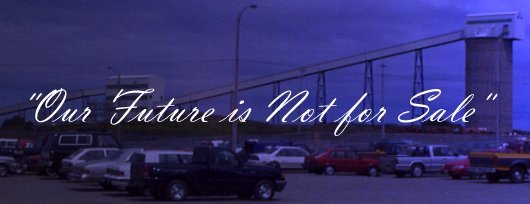Imagine waking up one morning to a phone call, answering quietly as to not awaken your family. It is early, about five in the morning, and it is time for you to be off for another day of work. The phone call you receive tells you the news that you do not have to worry about going off to work today, so you go back to bed. Not making too much a fuss over it. Now, imagine this happening the next morning, along with the morning after that.
Extend this to weeksÖ and into months. As this scarcity of work continues, your family life suffers, as well as the convenience of living. You often have barely enough to fit a grocery bill, or everyday taxes. Eventually, you receive a notice from your employer in the mail. What happened, to cause this disruption in your job? You have been laid off. Just like many others with the same occupation, consisting of hundredsÖ even thousands. All of which must support families, just like you. So, what happened here? This was not an act out of spite, or insolence. This was the act of a dying industry Ė The Coal mines of Cape Breton Island, Nova Scotia.
The mentioned scenario was a reality, which had affected many lives. Ruining most. This issue went rather unnoticed by residents of Western Canada, in such provinces like British Columbia, Alberta and Saskatchewan. But, to put something like this easily for those who are unrelated to a situation like the coalmines, just take note of the lumber mills, which are so common in a place like British Columbia. Now, imagine one day that the Federal government decided shut the entire operation down. Itís breathtaking over just how many individuals would be out of a job, if this had happened and how devastating it would be to the provinceís welfare. This is exactly what happened to Cape Bretonís coal industry.
For a little more depth on what this industry was like, one could say that mining was a very risky, yet important job. The threat for closure hounded families during the years of 1998 into 2000. Before this decade, everything that had been related to a piece of coal was prosperous. Many men went to work, early each morning or late each night. Risking their lives every day to support families. Things were considerably dangerous, but if one knows a Cape Breton miner well enough, it is proven that these men loved their jobs no matter what the cost.
Going down into those tunnels opened up an entirely different world to those who worked down there. Everything was pitch black, and so dark that you wouldnít be able to see a hand in front of your face, or the people you work with. Danger was everywhere, due to the fact workers are over two hundred feet underground and surrounded by tons of explosive material. One spark would send a tunnel up in flames. Cave ins, falls, flooding and loss of navigation were other threats to the men of the deeps. Despite all of this, as mentioned, miners were accustomed to their occupations and very dedicated. I know this for sure, because Iíve known these kinds of people. I grew up around them and lived with one, for my father was a miner. And like many others, his job was soon to be in jeopardy. I will always know these things, though I am far away.
After the decades of prosperity which DEVCO, the mining industry of Cape Breton, had experienced. It was beginning to suffer problems. One of its mines, Westray, had exploded. Killing few and injuring many. Following this event, another mine known as Phalen had an explosion as well. Luckily, none were killed and few were injured. The next to go were the Lingan mines, which ran about 800 miles below sea level. Naturally it was prone to flooding and one day, it did exactly that. The damage was serious, and the colliery had closed. Putting hundreds out of a job. Lingan is still flooded this present day. After all of this, people began to realize just how hazardous the mines were becoming. Due to this fact, along with the decreasing value of coal as a fuel and natural gases making their debut. This was proof that the mines were due for closure. Losing this industry had not only affected the employees, but numerous families and the community as a whole. Families lose what they owned, and the roof over oneís head could be gone the very next day. Kids wonít go to colleges, and promises wonít be met. Itís a very scary feeling to know of this. The final mines have closed last year, and the situation is dire.
Watching a community die is a very horrible thing, especially if this place was your homeland. This was the driving force to many Cape Breton families, which had caused them to move to the western coast of Canada. In only some cases, workers who had served the industry for over forty years were released with something known as a pension, which is a large sum of money given to support that man and his family for a few years. Unfortunately, many didnít go out of a job with a pension. But, they were given payment, being a smaller sum allotted as severance. So, there was some relief to those who were left jobless, but, usually it isnít enough. The saddest thing of all, is seeing something like this happen first hand. The downfall of an industry is not only devastating to a community, itís people and itís outlook. But, a massive blow to it's dignity.
So next time you see some poor soul, drunk on the streets in the dead of winter... please.. do not laugh. That person was likely a proud, hardworking individual in the years which held so much promise...
Our future is not for sale.
-----------------------------------

---------------------------